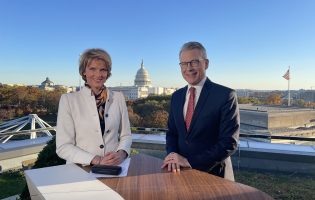
Partisan Divides and Popular Fronts
We are pleased to inaugurate the AGI 40th Anniversary series with the following article, which coincides with the 90th anniversary of the Nazi seizure of power (Machtergreifung) when Hitler was appointed chancellor …

Berlin’s Extraordinary Election
Flaws, Failures, and Their Consequences Peter Müller, a constitutional judge, described the elections that took place on September 26, 2021, in the city-state of Berlin as follows: “One could have …

Atomkraft: Jein
The Greens’ Identity Crisis in the Age of Nuclear Energy Expansion The Green Party (Die Grünen) in Germany evolved from a wave of social movements that began with student protests …
Episode 73: 2022—A Year in Review
As 2022 draws to a close, AGI President Jeff Rathke, AGI Senior Fellow and Director of Society, Culture, and Politics Program Eric Langenbacher and AGI Non-Resident Senior Fellow Klaus-Dieter Frankenberger …
Recent Authors
AGI provides knowledge, insights, and networks as tools to solve the challenges ahead.
Support Our Work
“The Capacity to Step into Someone Else’s Shoes”
How Local Initiatives Drive Cohesion and Global Progress “Social cohesion depends on the capacity to step into someone else’s shoes.” What emerged as a collective working definition for our research …

Jeff Rathke on the 2022 Midterm Elections
AGI President Jeff Rathke appeared in German media to discuss the 2022 midterm elections. Mr. Rathke gave his analysis of U.S. politics and what to expect following the elections on …

Olaf Scholz and the Cum-Ex Scandal
Why the German chancellor is stuck in a nasty multibillion dollar tax evasion scandal It can be blurry sometimes, the line between tax evasion—a criminal offense—and tax avoidance—morally questionable or …

AGI Profiles: Dr. Carsten Pillath
State Secretary in the Ministry of Finance Dr. Carsten Pillath serves as a State Secretary in the Federal Ministry of Finance, heading Directorate-Generals VII (Financial Market Policy) and E (European …
Episode 69: Germany’s Shifting Political Landscape: Through the Lens of the Lower Saxony Elections
On this episode of the Zeitgeist, AGI President Jeff Rathke, AGI Senior Fellow and Director of Society, Culture, and Politics Program Eric Langenbacher and AGI Non-Resident Senior Fellow Klaus-Dieter Frankenberger …





